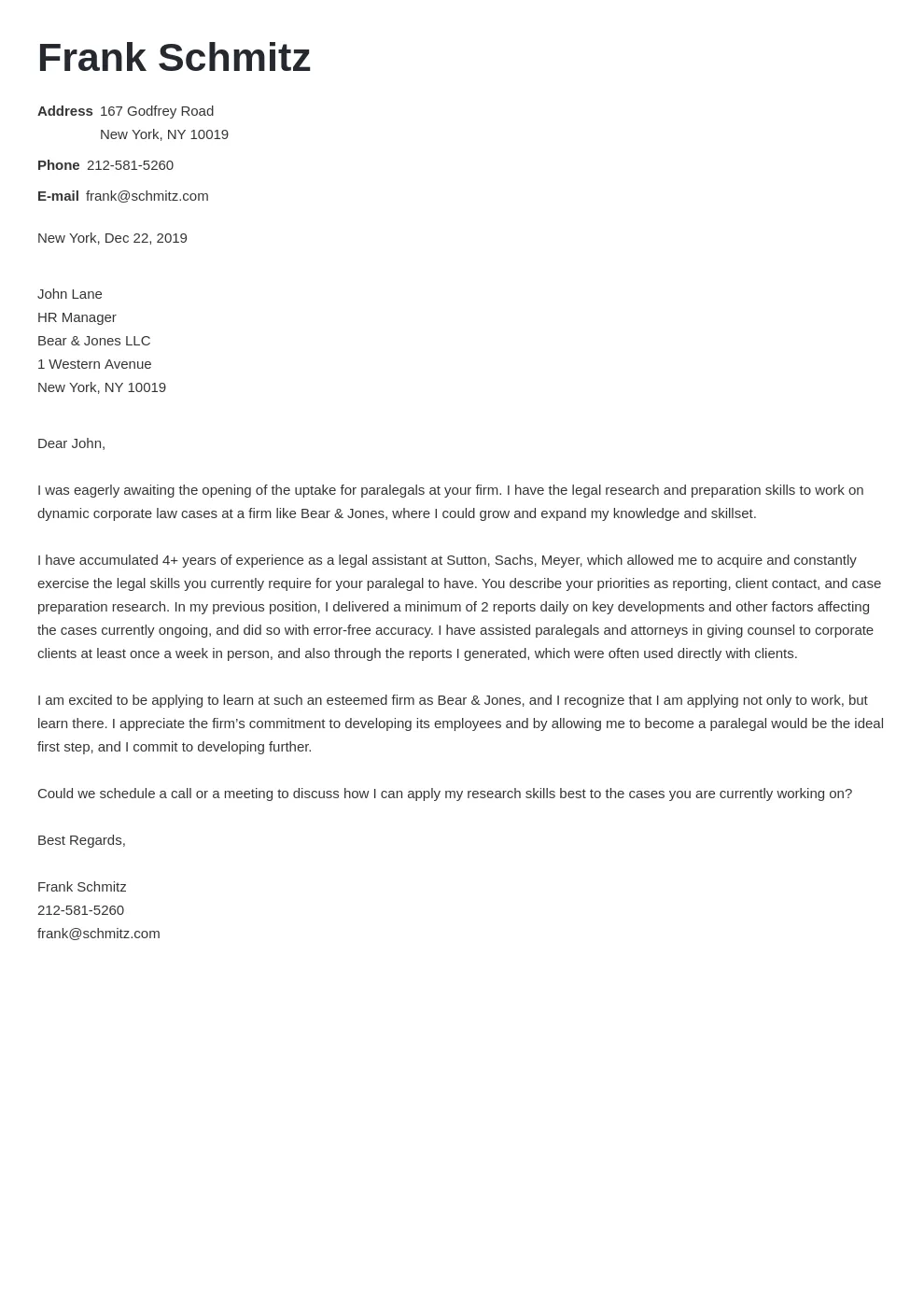Why a Strong Legal Cover Letter Matters
In the competitive field of law, a well-crafted cover letter can be your most powerful tool. It’s your first impression, a chance to showcase your personality, and an opportunity to demonstrate why you’re the perfect candidate for the job. A strong legal cover letter does more than just list your qualifications; it tells a story. It connects your skills and experience to the specific requirements of the position, highlighting your understanding of the legal field and your enthusiasm for the role. Without a compelling cover letter, your resume might get overlooked, no matter how impressive your credentials are. It is a critical component that can make the difference between landing an interview and being passed over.
Understanding the Core Components of a Legal Cover Letter
A successful legal cover letter follows a clear structure, ensuring all essential elements are included. This structured approach makes it easy for hiring managers to quickly assess your qualifications and determine if you’re a good fit. Every section plays a vital role in conveying your message effectively. Mastering these components is key to crafting a cover letter that stands out in a pile of applications. The structure ensures your message is clear, concise, and persuasive, increasing your chances of securing an interview.
Header and Contact Information
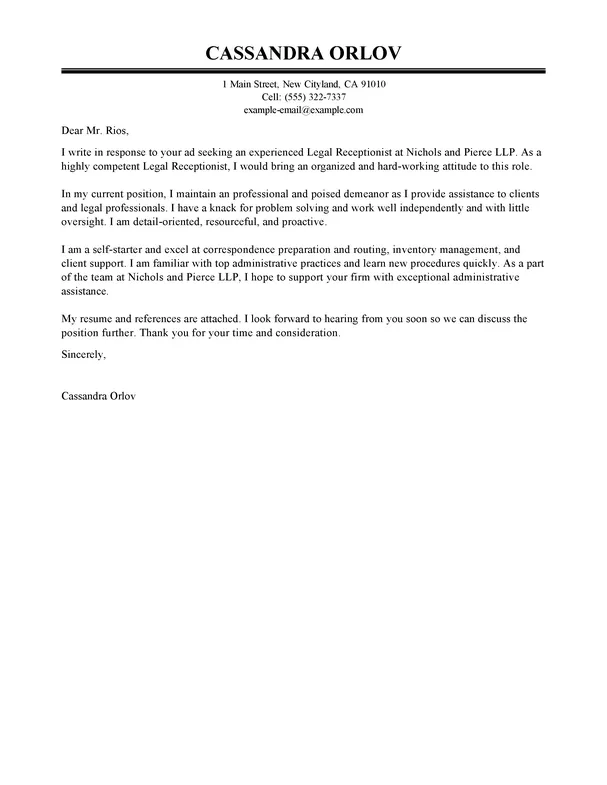
The header of your cover letter must contain your full name, address, phone number, and email address. Ensure the information is accurate and up-to-date. It’s crucial to use a professional email address. Additionally, include the date and the hiring manager’s name and address (if you have it). This demonstrates your attention to detail and professionalism, setting a positive tone from the start. Proper header formatting establishes your professionalism and makes it easy for the recipient to contact you.
The Salutation
Always address the hiring manager by name. Research the company’s website or LinkedIn to find the appropriate person. Using a name personalizes your letter and shows that you’ve taken the time to learn about the organization. If you can’t find a name, use a professional salutation like Dear Hiring Manager, but avoid generic greetings like To Whom It May Concern. A personalized greeting immediately captures attention and demonstrates genuine interest in the opportunity.
The Opening Paragraph
The opening paragraph should immediately capture the reader’s attention. State the specific position you’re applying for and briefly explain where you saw the job posting. Then, provide a concise overview of why you’re a good fit. Mention a key skill or experience that aligns with the job requirements. The first paragraph is your hook; it should pique the reader’s interest and encourage them to continue reading. A compelling opening will make your application stand out from the competition.
Body Paragraphs: Showcasing Your Skills
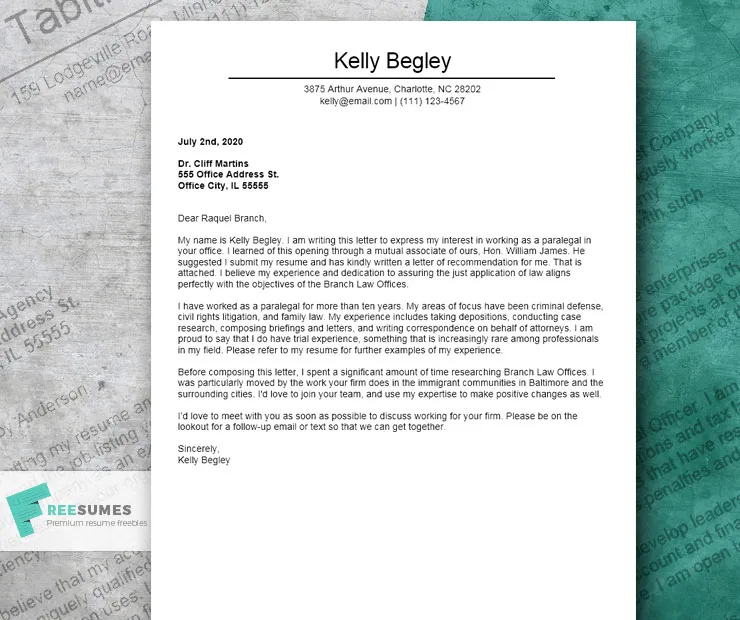
The body of your cover letter is where you highlight your skills and experience, using specific examples to demonstrate your abilities. Tailor the content to match the job description’s requirements. Use action verbs to describe your accomplishments. Each paragraph should focus on a different skill or area of expertise relevant to the legal field. This section provides concrete evidence of your capabilities, making a strong case for your candidacy. Provide compelling examples to showcase your value.
Example 1 Research and Writing Skills
Showcase your research and writing abilities with specific examples. Mention a time you conducted extensive legal research, perhaps for a case brief or legal memorandum. Detail the resources you used, the methodologies you employed, and the outcomes you achieved. Similarly, provide an example of your legal writing skills. This could involve drafting legal documents, such as contracts, pleadings, or client letters. Emphasize the clarity, precision, and persuasiveness of your writing. Demonstrate your ability to communicate complex legal information effectively.
Example 2 Analytical Abilities
Highlight your analytical abilities by describing instances where you assessed legal issues, identified key facts, and developed logical arguments. This might involve analyzing case law, statutes, or regulations. Outline the thought process you followed, the tools you used, and the conclusions you reached. Illustrate how you broke down complex legal problems into manageable components and provided practical solutions. Demonstrating your capacity for critical thinking is essential in any legal role, so provide examples of your ability to solve difficult problems.
Example 3 Communication and Interpersonal Skills
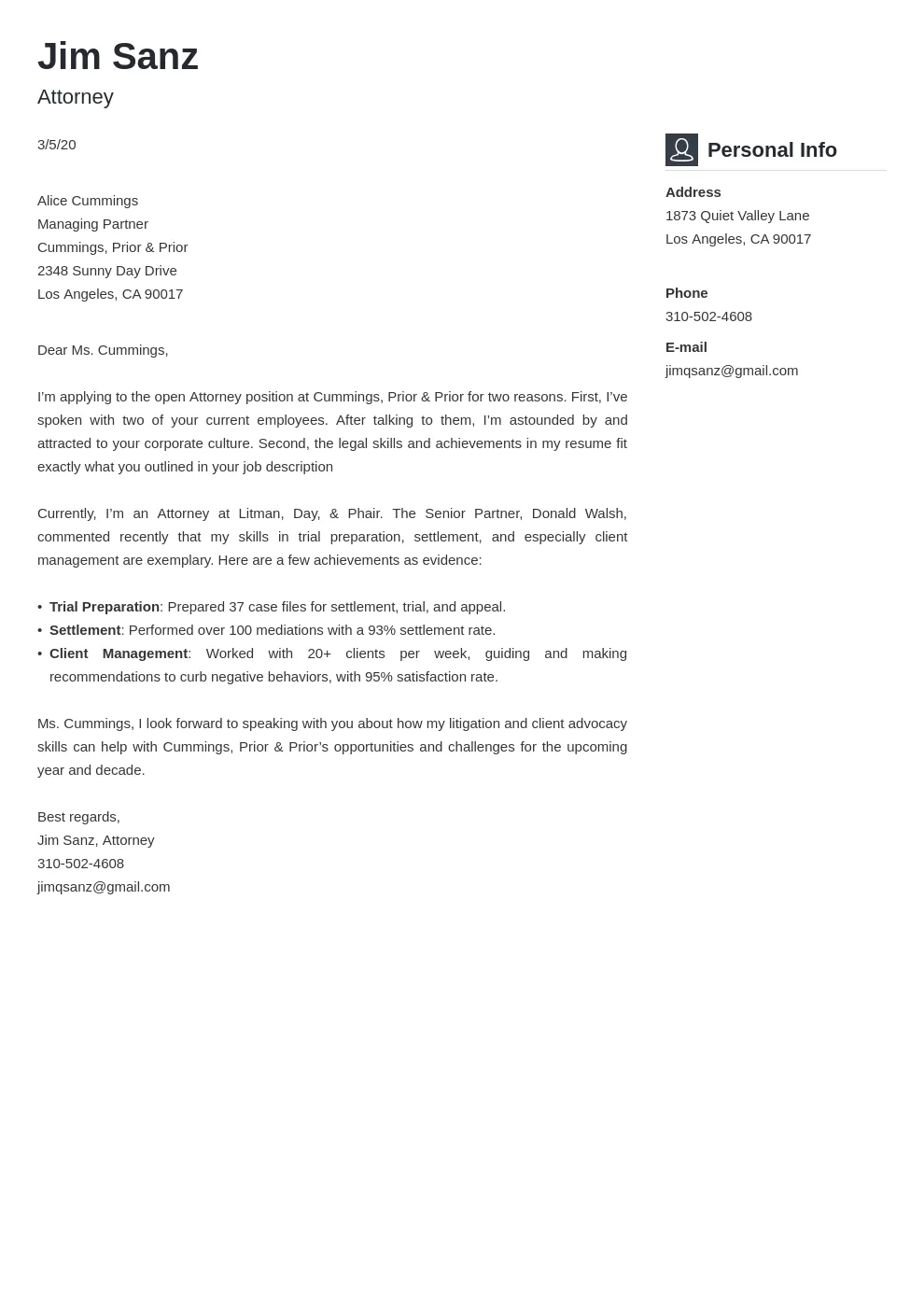
Legal professionals need strong communication and interpersonal skills to effectively interact with clients, colleagues, and opposing counsel. Describe instances where you communicated complex legal information clearly and concisely. Mention instances where you presented arguments to a judge, negotiated with opposing counsel, or assisted clients. Include examples of how you built rapport with clients and colleagues, managed conflicts, and worked collaboratively. Detail specific situations where you demonstrated empathy, active listening, and the ability to build trust.
Example 4 Experience and Achievements
Provide specific examples of your experience and achievements in the legal field. Quantify your accomplishments whenever possible. For example, if you improved the efficiency of a legal process, state the percentage improvement. If you won a case, mention it. If you successfully drafted a contract, note the value. The goal is to demonstrate the value you bring to the table. Use accomplishments to support your claims and prove that you can deliver results. Show how your past experiences make you a valuable asset.
Example 5 Professionalism and Ethics
Highlight your commitment to professionalism and ethics. Include instances where you demonstrated integrity, discretion, and adherence to ethical principles. The legal profession demands the highest standards of conduct. Detail specific examples that illustrate your commitment to confidentiality, fair dealing, and respect for the law. Mention any ethics training you’ve completed or awards you’ve received related to ethics. The focus here should be demonstrating that you are trustworthy and reliable, vital for any legal role.
The Closing Paragraph and Call to Action
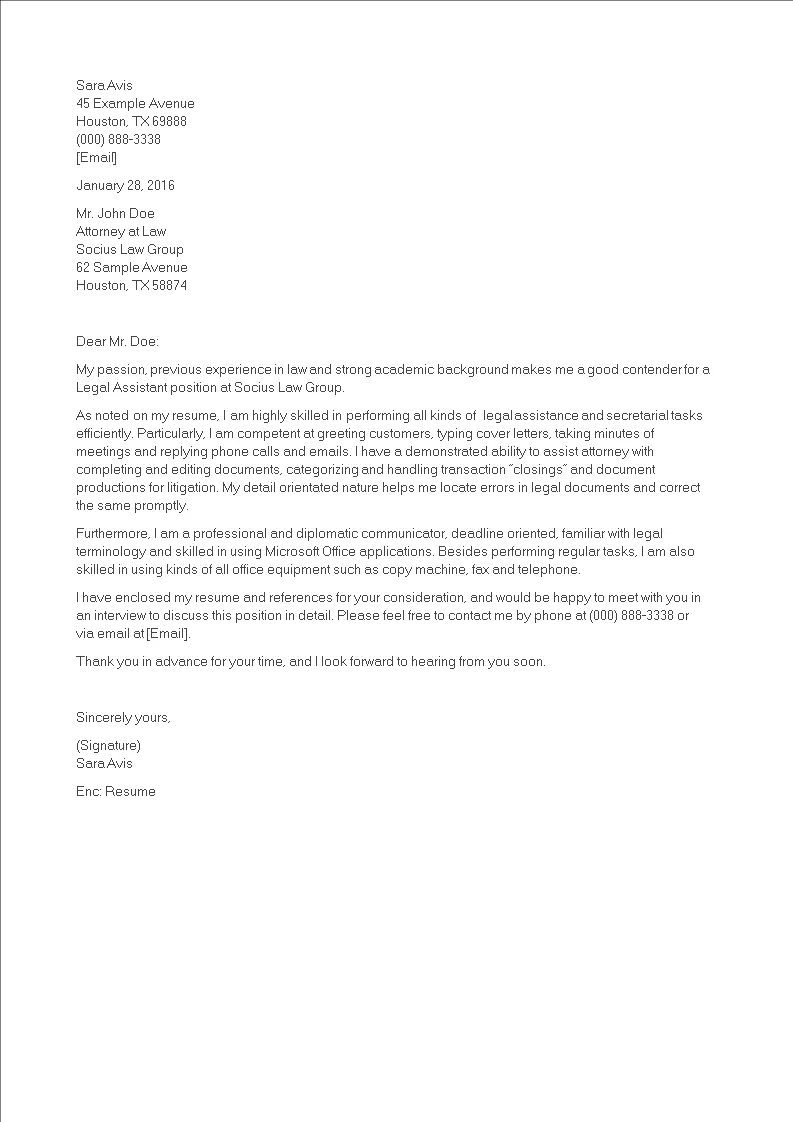
In the closing paragraph, reiterate your interest in the position and thank the hiring manager for their time and consideration. End with a clear call to action. Express your eagerness to discuss your qualifications further and indicate your availability for an interview. Include your phone number and email address again. This reinforces your professionalism and enthusiasm, encouraging the hiring manager to take the next step and contact you.
Formatting and Presentation Tips for Your Legal Cover Letter
The formatting and presentation of your legal cover letter are just as important as its content. A well-formatted cover letter is easy to read and professional in appearance, making a positive impression. Ensure your cover letter is clean, well-organized, and free of errors. Using a clear font, consistent spacing, and concise paragraphs enhances readability and makes it easier for the hiring manager to appreciate your qualifications. Poor formatting can distract from your content, so attention to detail is essential.
Proofreading and Editing
Proofread your cover letter multiple times to catch any grammatical errors, typos, or inconsistencies. Errors can undermine your credibility and demonstrate a lack of attention to detail. Have a friend or colleague review your letter as well, as a fresh pair of eyes can often spot mistakes you might have missed. Use a grammar checker. Ensure your writing is clear, concise, and error-free before submitting your application.
Choosing the Right Font and Format
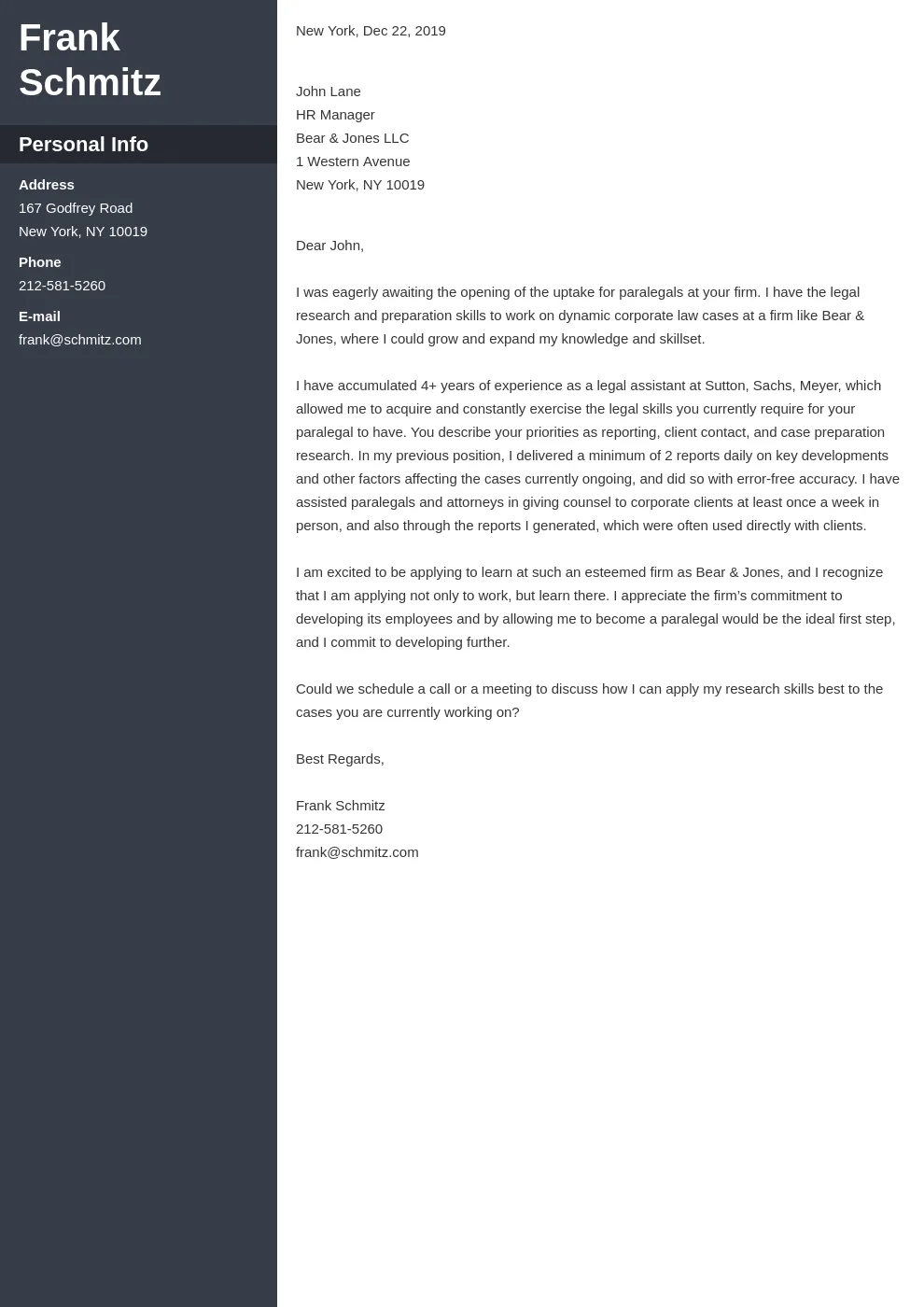
Choose a professional, easy-to-read font like Times New Roman, Arial, or Calibri. Use a font size between 10 and 12 points. Keep the formatting consistent throughout the letter, using single or 1.15 line spacing. Use standard 1-inch margins. Make sure your letter is properly aligned and visually appealing, without excessive bolding or italics. Proper formatting shows that you pay attention to detail and respect professional standards. Simple and professional formatting ensures your message is easy to read and understand.
Tailoring Your Cover Letter to the Specific Job
Always customize your cover letter for each job application. Review the job description carefully and identify the key requirements and skills the employer is seeking. Highlight how your skills and experiences align with those requirements. Generic cover letters are easily spotted. By tailoring your letter, you show you understand the role and are genuinely interested in the opportunity. Customization increases your chances of getting noticed and securing an interview.
